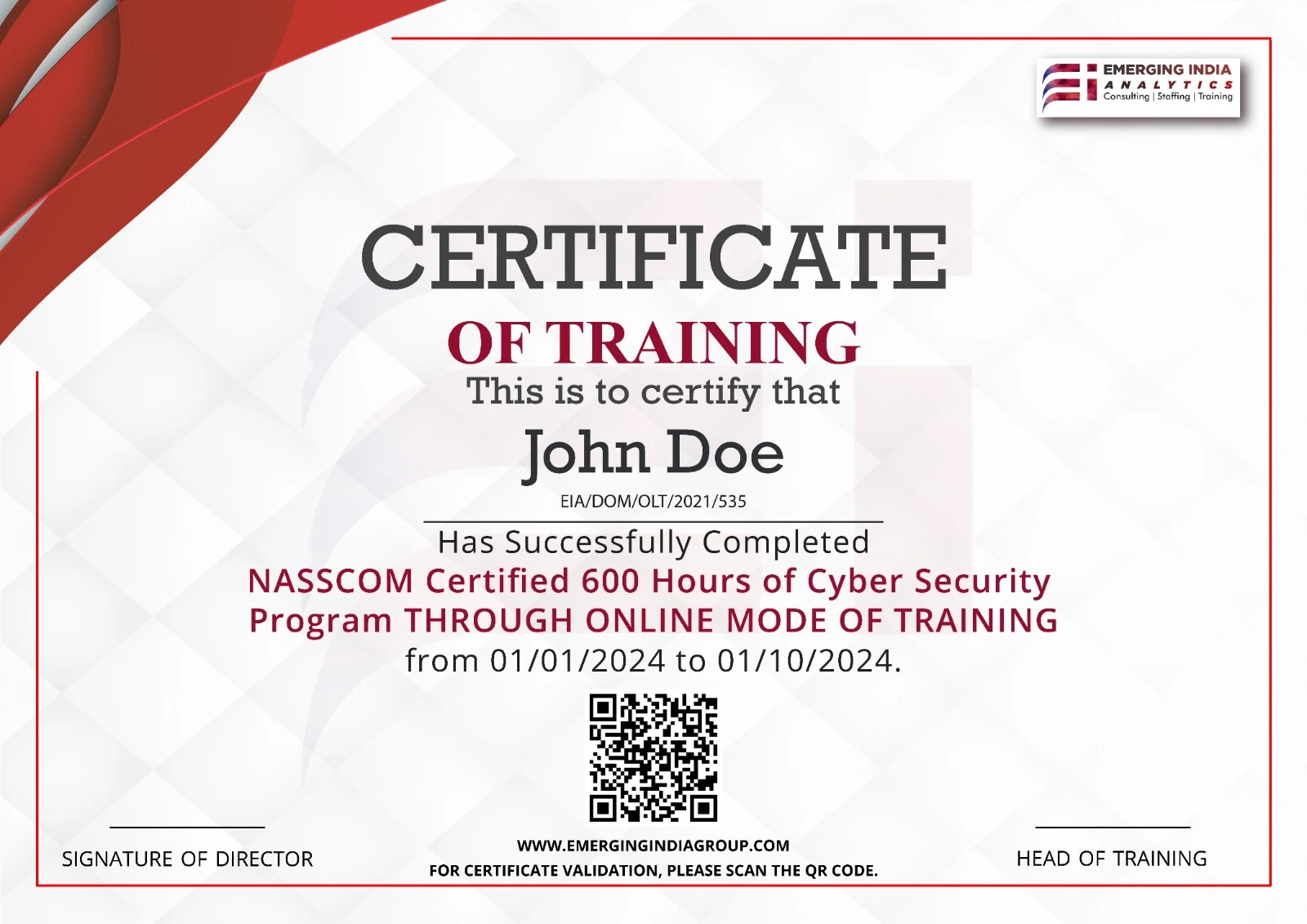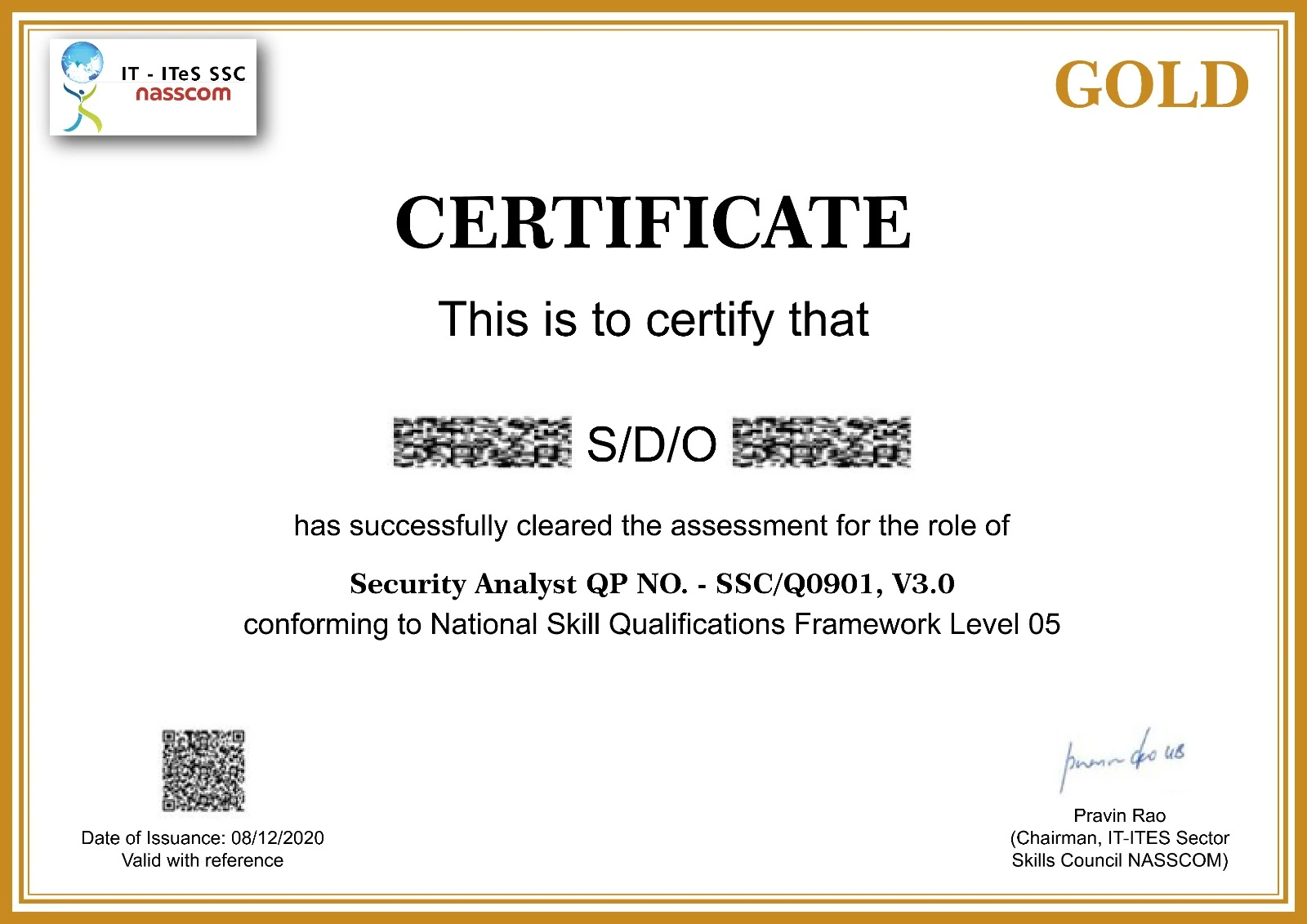Cyber Security Institute in Chandigarh
100% Job Oriented Course
Ever dreamt of safeguarding the digital frontier? With cyber threats constantly evolving, the demand for skilled cybersecurity professionals is booming in India. If you’re looking to launch a fulfilling career in this high-growth field, look no further than Emerging India Analytics, the best Cyber Security Institute in Chandigarh. Our meticulously crafted, 100% job-oriented courses equip you with the knowledge and practical expertise to tackle real-world cyber challenges. Taught by industry veterans and packed with the latest tools and techniques, our programs are designed to make you a highly sought-after cybersecurity professional. Join Emerging India Analytics and take your first step towards a thrilling career defending the digital future!
- Dual Certification
- Flexible Online Classes
- 100% Placement Assistance
In Association With




Top Recruiters














Become a Cybersecurity Expert in Chandigarh with Emerging India Analytics
Chandigarh’s booming tech scene demands a strong line of defense against cyber threats. Are you ready to be an expert on the frontlines? Emerging India Analytics, the best institute for cyber security courses in Chandigarh, offers a comprehensive program designed to transform you into a cybersecurity powerhouse.
Our meticulously crafted curriculum delves into crucial aspects of cyber security, equipping you with the knowledge to combat:
- Network Security: Learn to fortify firewalls, detect vulnerabilities, and prevent unauthorized access.
- Ethical Hacking: Master the tools and techniques hackers employ, allowing you to proactively identify and patch system weaknesses.
- Incident Response: Develop the skills to effectively respond to cyberattacks, minimize damage, and ensure swift recovery.
Emerging India Analytics goes beyond theory. Our cyber security course in Chandigarh with placement opportunity provides hands-on training through real-world scenarios, preparing you for the challenges you’ll face in the field. Industry-experienced instructors and industry-standard tools ensure you graduate with the expertise and certifications coveted by top employers. Don’t just dream of a career in cybersecurity – make it a reality with Emerging India Analytics.
Why Choose Emerging India Analytics?
Aspiring to become a cybersecurity expert in Chandigarh? Look no further than Emerging India Analytics, the leading cyber security course institute in Chandigarh. Here’s why we stand out:
Diverse Course Offerings: We understand that one size doesn’t fit all. We offer a multitude of cyber security courses in Chandigarh tailored to different skill levels and career goals.
Well-Crafted and Accessible: Our curriculum is meticulously designed to be clear and engaging, even for students with no prior technical background. Complex concepts are broken down into manageable modules, making learning a smooth and rewarding experience.
Flexible Learning: We offer convenient online classes with two-way interaction. This allows you to learn at your own pace, from the comfort of your home, while still enjoying the benefits of live instruction and interaction with instructors and fellow students.
Expert Instructors: Our faculty comprises seasoned cybersecurity professionals who bring their real-world experience into the classroom. You’ll learn from the best in the industry, gaining invaluable insights and practical guidance.
Hands-on Learning: Emerging India Analytics goes beyond theory. We emphasize practical based learning through more than 50+ projects that simulate real-world scenarios. These projects allow you to apply your knowledge in a dynamic and engaging way, building the skills and confidence to excel in the field.
Holistic Approach: Offensive & Defensive Security: Our comprehensive program equips you with expertise in both offensive and defensive cybersecurity. You’ll learn about ethical hacking techniques, enabling you to identify and address potential vulnerabilities before attackers exploit them. Additionally, you’ll master defensive strategies to build robust security systems and effectively respond to cyber threats.
Personalized Support: We are committed to your success. Our one-on-one doubt sessions allow you to get personalized guidance from instructors, ensuring you have a clear understanding of even the most challenging concepts.
By choosing Emerging India Analytics, you gain not only technical expertise but also the practical skills and industry insights needed to thrive in the ever-evolving world of cybersecurity. Contact us today and embrace a fulfilling career protecting the digital future!
Hiring Partners














Pricing Plans
Our Loan Partners






Zero Cost EMI options Available
from RBI Approved NBFCs
Starting from ₹5,999*
Others Payment Options

Internet Banking

Credit / Debit Card
Total Admission Fees
₹1,12,099*(Including GST)
USD $1,450
Gain Industry Recognition: Get Certified by NASSCOM
Fast-track your cybersecurity career with a NASSCOM-certified program at Emerging India Analytics, a top cyber security institute in Chandigarh. Upon successful completion of our comprehensive cyber security course in Chandigarh, you’ll earn a coveted NASSCOM certification – a mark of distinction recognized by leading IT employers across India.
Why is NASSCOM certification so valuable? NASSCOM is a powerhouse in the Indian IT industry. Their endorsement signifies your mastery of the latest cybersecurity skills and knowledge, aligning with the globally recognized Qualification Pack (QP) Level 6. This is the highest benchmark for cybersecurity programs, not just in India, but worldwide.
Earning a NASSCOM certification sets you apart from the competition. It demonstrates your commitment to excellence and positions you for success in the dynamic cybersecurity landscape. Imagine the doors that open with this industry-recognized credential on your resume.
Join Emerging India Analytics today and take the first step towards a fulfilling career in cybersecurity. Our NASSCOM-certified program equips you with the expertise and recognition you need to thrive in this high-demand field. Don’t miss this opportunity to gain a competitive edge and become a cybersecurity leader!
Explore Our Comprehensive Cybersecurity Courses in Chandigarh
Emerging India Analytics, widely regarded as the best cyber security institute in Chandigarh. We offer a comprehensive suite of cybersecurity courses, meticulously designed to equip you with the wholesome knowledge and practical skills needed to excel in this dynamic field.
Not Your Ordinary Course: Our curriculum goes beyond basic concepts. We delve deep into the core principles of cybersecurity, providing you with a well-rounded understanding of the ever-evolving threats and defensive strategies.
Customizable Learning: We understand that one size doesn’t fit all. Our customizable cybersecurity courses allow you to tailor your learning path to your specific needs and career goals. Whether you’re a complete beginner or a seasoned IT professional looking to specialize, we have a program designed to propel you forward.
Hands-on Focus: Emerging India Analytics emphasizes cybersecurity practicals. You’ll gain extensive experience using industry-standard tools and technologies through a series of 50+ real-world projects. This practical approach ensures you graduate with the confidence and expertise to tackle real-world security challenges.
Offensive & Defensive Expertise: Our program equips you with a comprehensive understanding of both offensive and defensive cybersecurity. You’ll master ethical hacking techniques, allowing you to identify and address potential vulnerabilities before attackers exploit them. Additionally, you’ll gain in-depth knowledge of defensive strategies to build robust security systems and effectively respond to cyber threats.
Sample Module: Unveiling the Details
Here’s a glimpse into the depth and breadth of knowledge you’ll gain through our Module 1: Python and Linux. This module provides a solid foundation for your cybersecurity journey, covering essential topics like:
- Programming Fundamentals: Master Python, a versatile language widely used in cybersecurity.
- Linux Exploration: Gain proficiency in Linux, the dominant operating system for security professionals.
- Data Analysis Techniques: Learn powerful libraries like NumPy and Pandas to analyze security data effectively.
- Web Scraping Fundamentals: Explore tools like Scrapy and Beautiful Soup to extract valuable information from websites.
This is just a single module within our comprehensive curriculum. We cover a vast array of crucial topics including:
- Information Security and Attacks: Understand the core concepts of cybersecurity, including hacking techniques, ethical hacking principles, and risk management.
- Web Technologies, OWASP, DVWA, Bwapp with Practicals: Delve into web application security, exploring vulnerabilities and utilizing industry-standard tools like Metasploit for practical exploitation scenarios.
- Cryptography with Practicals: Master encryption techniques, a fundamental pillar of information security.
- Network Concepts: Gain a thorough understanding of network protocols, vulnerabilities, and security measures.
- Device Log Correlation, Data Management, DLP, Data Backup: Explore techniques for managing and protecting sensitive data, including data leakage prevention and backup strategies.
- ISO, ISMS, Compliance, Risk Management: Navigate the world of cybersecurity regulations, standards, and risk management frameworks.
- Information Security Management – Roles and Responsibilities: Understand the hierarchy of information security within an organization and the responsibilities of key personnel.
- Configuration and Incident Handling: Learn how to configure security devices effectively and handle security incidents with a structured approach.
- Security Audit: Master vulnerability assessment methodologies and security auditing techniques.
- Penetration Testing, Exploitations (Web, Windows, Linux) Practicals and Report Writing & Documentation: Gain hands-on experience with penetration testing tools and methodologies, preparing you to identify and exploit vulnerabilities in real-world scenarios.
- Malware, Virus, Worms Etc. And Password Hacking with Practicals: Understand different malware types and password hacking techniques, equipping you to defend against these common threats.
- Information Security Audit: Learn how to conduct comprehensive information security audits, ensuring the effectiveness of your organization’s security posture.
- Capstone Project: Apply your acquired knowledge and skills to a practical project, solidifying your understanding and showcasing your capabilities to potential employers.
Become a Cybersecurity Expert with Emerging India Analytics
By choosing Emerging India Analytics, the best institute for cyber security course in Chandigarh, you’re not just acquiring technical skills; you’re gaining the wholesome knowledge and practical experience needed to thrive in the ever-evolving world of cybersecurity. Contact us today and embark on your journey to becoming a cybersecurity expert!
Cyber Security Market Analysis
The cybersecurity market is experiencing phenomenal growth, projected to reach a staggering USD 185.70 billion in 2024. This surge is driven by a potent cocktail of factors:
- Escalating Cybercrime: Recorded cyberattacks have skyrocketed, with data breaches and financial fraud becoming commonplace. Businesses and individuals alike are increasingly aware of the risks and are actively seeking solutions.
- Rapid Technology Adoption: The proliferation of new technologies like cloud computing and the Internet of Things (IoT) creates new attack surfaces for malicious actors. Organizations need robust security measures to safeguard their expanding digital footprint.
- Heightened Data Sensitivity: As more sensitive data migrates online, regulations like GDPR (General Data Protection Regulation) are raising the stakes for data breaches. Businesses are investing heavily in compliance to avoid hefty fines and reputational damage.
This growth is not evenly distributed across all segments. Security services, encompassing threat detection, incident response, and vulnerability assessments, lead the pack with a projected market volume of USD 97.30 billion in 2024. This dominance reflects the growing complexity of cyber threats and the increasing reliance on security expertise.
However, cybersecurity solutions, which include firewalls, encryption software, and security information and event management (SIEM) tools, are also experiencing significant growth, with a projected market volume of USD 88.39 billion in 2024.
The United States Reigns Supreme: The U.S. market is the undisputed leader, projected to generate a whopping USD 81.37 billion in revenue in 2024. This dominance can be attributed to factors like a mature digital infrastructure, a strong cybersecurity regulatory landscape, and the presence of leading cybersecurity companies.
Key Market Drivers: Several key drivers are fueling the cybersecurity market’s growth:
- Rapid Adoption of New Technologies: With the constant emergence of new technologies, the attack surface for cybercriminals keeps expanding. Businesses need to invest in security solutions to keep pace with this evolving landscape.
- General Increase of Cyberattacks: The sheer volume and sophistication of cyberattacks are forcing organizations to prioritize cybersecurity investments.
- GDP Growth: As economies grow, businesses tend to allocate more resources towards cybersecurity measures.
- Impact of Inflation: Inflation can indirectly boost cybersecurity spending as businesses look to protect their increasingly valuable digital assets.
Challenges on the Horizon: Despite the positive outlook, a few challenges loom:
- Cybersecurity Workforce Shortage: The cybersecurity industry suffers from a significant skills gap, making it difficult for organizations to find qualified professionals.
Equipping Yourself for the Digital Age:
With the cybersecurity landscape constantly evolving, investing in Emerging India Analytics cyber security course in Chandigarh with placement opportunity is a prudent decision for anyone seeking a career in this high-demand field. EIA cyber security course institute in Chandigarh offer comprehensive programs that equip students with the knowledge and skills necessary to combat cyber threats. Whether you’re a recent graduate or a seasoned IT professional looking to upskill, a cybersecurity course can be a valuable asset in your career journey.
Finding the Right Institute:
While researching best institute for cyber security course in Chandigarh, consider factors like curriculum, faculty expertise, placement opportunities, and industry recognition. Look for institute that offer practical training alongside theoretical knowledge, as hands-on experience is crucial in this field.
Looking Ahead: The cybersecurity market is poised for continued growth in the years to come. As cyber threats evolve, the demand for robust security solutions will only intensify. Businesses and individuals alike must prioritize cybersecurity measures to protect their data and digital infrastructure in this increasingly connected world. By investing in education and training, you can become part of the solution and safeguard the digital future.
Salary Package of Cyber Security Professionals
Salary Table
| Job Title | Entry-Level (0-2 years) | Mid-Level (3-5 years) | Senior-Level (5+ years) |
| Cybersecurity Analyst | ₹4,80,000 – ₹6,40,000 | ₹6,80,000 – ₹8,80,000 | ₹9,20,000 – ₹19,20,000 |
| Network Security Engineer | ₹5,60,000 – ₹7,20,000 | ₹7,60,000 – ₹9,60,000 | ₹10,00,000 – ₹22,00,000 |
| Information Security Manager | ₹7,20,000 – ₹8,80,000 | ₹9,20,000 – ₹11,20,000 | ₹12,00,000 – ₹24,40,000 |
| Penetration Tester | ₹6,00,000 – ₹7,60,000 | ₹8,00,000 – ₹10,00,000 | ₹10,40,000 – ₹22,80,000 |
| Security Consultant | ₹6,40,000 – ₹8,00,000 | ₹8,40,000 – ₹10,40,000 | ₹10,80,000 – ₹23,60,000 |
| Chief Information Security Officer (CISO) | N/A | N/A | ₹14,40,000 – ₹30,00,000 |
Detailed Explanation
Cybersecurity professionals are in high demand across various industries in India, and their salary packages reflect the critical importance of their roles. Below is a detailed explanation of salary packages based on job titles and experience levels:- Cybersecurity Analyst: Entry-level Cyber Security analysts can expect salaries ranging from ₹4,80,000 to ₹6,40,000 annually. With experience, mid-level analysts earn between ₹6,80,000 and ₹8,80,000, while senior analysts can command salaries from ₹9,20,000 to ₹19,20,000.
- Network Security Engineer: Network security engineers start with salaries between ₹5,60,000 and ₹7,20,000. As they gain experience, their salaries increase to a range of ₹7,60,000 to ₹9,60,000. Senior network security engineers can earn from ₹10,00,000 to ₹22,00,000.
- Information Security Manager: Entry-level information security managers earn between ₹7,20,000 and ₹8,80,000. Mid-level managers see their salaries rise to ₹9,20,000 to ₹11,20,000, and those in senior positions can earn between ₹12,00,000 and ₹24,40,000 annually.
- Penetration Tester: Starting salaries for penetration testers range from ₹6,00,000 to ₹7,60,000. With additional experience, they can earn between ₹8,00,000 and ₹10,00,000. Senior penetration testers can expect to make ₹10,40,000 to ₹22,80,000.
- Security Consultant: Security consultants have starting salaries between ₹6,40,000 and ₹8,00,000. Mid-level consultants earn between ₹8,40,000 and ₹10,40,000, while those with more experience can command salaries from ₹10,80,000 to ₹23,60,000.
- Chief Information Security Officer (CISO): This top-level position typically requires extensive experience. While entry and mid-level positions are not applicable, senior-level CISOs can earn between ₹14,40,000 and ₹30,00,000 annually.
Factors Affecting Salary
Several factors can influence the salary of cybersecurity professionals, including:- Location: Salaries can vary significantly depending on the geographic location due to the cost of living and demand for cybersecurity skills.
- Industry: Different industries may offer varying salary levels. For instance, finance, healthcare, and technology sectors often provide higher compensation.
- Certifications: Professional certifications such as CISSP, CISM, CEH, and others can enhance earning potential.
- Education: Higher educational qualifications, such as a master’s degree in cybersecurity, can lead to higher salaries.
- Experience: More years of relevant experience generally lead to higher salary packages.
Cybersecurity Course Syllabus
The 600-Hour NASSCOM Cybersecurity Program is structured to provide an in-depth understanding of various cybersecurity concepts and practical skills. The program is divided into several modules covering Python and Linux, Information Security and Attacks, Web Technologies, Cryptography, Network Concepts, Data Management, Risk Management, Incident Handling, Security Operations, and Capstone Projects.
Module 1. Python and Linux
- Day 1: Introduction to python, conditional statement, variables, data types, data structures, functions, request, OS, exception handling, file handling. .
- Day 2: Numpy, and Pandas .
- Day 3: What is Machine Learning, types of machine learning, scikit learn.
- Day 4: What is Natural Language Processing, stop words, Tokenization, Lemmatization, NLTK library.
- Day 5: Introduction to Attributes, scrapy Installation, spider building with scrapy, xpath.
- Day 6: Beautiful soup / Selenium, Installation and scrapping..
- Day 7: Twisted, nmap.
- Day 8: Pymetasploit.
- Day 9: Mechaniz.
- Day 10: Cryptography Library.
- Day 11: Basics of Linux, file permission, ownership, editors.
- Day 12: ftp, Apache.
- Day 13: samba, nfs .
- Day 14: shell scripting.
-
📚No. of Lectures: 14
-
⏳Duration of Lecture: 42 Hour
-
📝Assessment: 3
-
🌟Assignment: 3
Module 2. Information Security and Attack
- Day 15:
What is Hacking ? , Computer Security Threats, Goals of Ethical Hacking, Skills and Tools required for Ethical Hackers,
Process of Ethical Hacking, Process of Ethical Hacking – Demonstration Part 1,Process of Ethical Hacking
– Demonstration Part 2. - Day 16: Information Gathering Concepts, Foot printing, Reconnaissance, Active Passive Scanning
. - Day 17:
CIA (Confidentiality, Integrity & Availability) Threat, Vulnerabilities, Threat Actor, Risk etc definitions & concept.
Advanced Cyber Security – Threats and Governance, What are Threats?, Types of threats (spoofing, tampering, repudiation,
information breach, DOS, elevation of privilege),GitHub DDos Attack,. - Day 18: Types of attack(DOS, Phishing, Ransomware).
- Day 19: Introduction and importance to information security, elements of information security (purpose, audience and scope,
security objective-CIA, Authority and access control, data classification (level 1-5), support and operation, security
awareness, responsibilities rights and duty. Principle of Information security (Confidentiality, Integrity, Availability). - Day 20: Introduction to data security, types of data security (Encryption, Data Erasure, Data Masking, Data Resiliency),
data security strategy (Physical security of servers and user devices, Access management and controls, Backups).
- 📚No. of Lectures: 6
- ⏳Duration of Lecture: 18 Hours
- 📝Assessment: 2
- 🌟Assignment: 1
- Day 21: Practical on Metasploit and bwap .
- Day 22: bWAPP Features, Why should you learn bWAPP?, bwapp prct.
- Day 23: Dvwa feature and use.
- Day 24:Kali Linux (tool) Demonstration – Web Application attack: Broken Authentication, Demonstration – Web Application attack: Blind SQL Injections, Demonstration – Web Application attack: Cross site scripting.
- Day 25: Web Application Domain, Web Application Domain: Common Attacks, Hacking Methodology,.
- Day 26: “Mobile Application Domain, Mobile Application Domain: Types of Android Attacks, steps of Incident preventation, network reconnaissance incidents (host detection, port enumeration, vulnerability assessment), DoS, Malicious Code,”.
- Day 27:“Information gathering (Spiders, Robots and Crawlers/Search Engine Discovery/Reconnaissance/Testing Web Application Fingerprint/. Analysis of Error Codes:)” .
-
📚No. of Lectures: 7
-
⏳Duration of Lecture: 21 Hours
-
📝Assessment: 2
-
🌟Assignment: 1
- Day 28: “Remediation Planning, Encryption, What is Encryption?, Prerequisites for Encryption, How does Encryption work?, Vulnerability Assessment”.
- Day 29:“What is Decryption? , Encryption Vs Decryption, Types of Encryption, Encryption Algorithms and Protocols, Web application architecture, Web application attacks, Web server architecture, Web server attacks”.
-
📚No. of Lectures: 2
-
⏳Duration of Lecture: 6 Hours
-
📝Assessment: 1
-
🌟Assignment: 1
- Day 30: “Introduction to information security controls, types of controls (organizational control, people control, physical control, technological control), preventive, corrective and digestive control,”.
- Day 31: OSI concept, Protocols, ARP, SMTP, ICMP, TCP, 3 way Handshaking.
- Day 32: “Security Market Outlook, Computer Networks – Architecture, Layered architecture, Open Systems Interconnect (OSI) Model, Transmission Control Protocol/Internet Protocol (TCP/IP), Network Scanning, Enumeration, Common Network Threats/Attacks, Packet Inspection,”.
- Day 33: Deep Packet Inspection(Intrusions detection system and Intrusion Prevention, System), IP Security, ICMP attacks.
- Day 34: “TCP and UDP Security. Attacking Availability: Denial-of-Service, attacks, Distributed DOS attacks, SSL/TLS Data/Application Security: confidentiality, Integrity, availability, authorization, authentication, identification, non-repudiation, types of control (preventive, detective, corrective, deterrent, recovery, compensating), access control, Security Vulnerability Management”.
- Day 35: “Network devices (Hub, Switch, Router, Bridge, Gateway, Modem, Repeater, Access Point), Configuration of network devices, Network configuration tool, Firewall, Firewall configuration,”.
-
📚No. of Lectures: 6
-
⏳Duration of Lecture: 18 Hours
-
📝Assessment: 2
-
🌟Assignment: 2
- Day 36: “Introduction to data leakage (direct losses and indirect losses.), Types of Data Leakage, NPI (e.g. Customer Data), Confidentiality Info, PHI (e.g. Patient’s Records),Intellectual Property, Data Leak Vector :- HTTP, Email, Networked Printer, End Point, Internal Mail,”.
- Day 37: IM, Webmail, Data Classification, types of data classification, steps and process of data classification,.
- Day 38: “Content awareness, Content analysis techniques (rule based, data based finger printing, partial document matching, lexicon), DLP (data in motion, data in rest, data in use), DLP limitation, DLP using DRM,”.
- Day 39: “DEFINITION OF EVENT CORRELATION, EVENT CORRELATION USE CASES AND TECHNIQUES, BENEFITS OF EVENT CORRELATION, Event log,”.
- Day 40: “Key concept of log management (log, event, incidents), log management process and challenges, configuration of windows event log, SIEM, Remote Software Access, Web Proxies, Firewall, Routers.”.
- Day 41: “What is Data backup, Importance of data backup, why to backup, RPO, RTO, Types (Mirror, Full, Differential, incremental backup, Cloud Backup, FTP backup,),”.
- Day 42: “Storage types (local or USB Disks, Network Shares and NAS, Data Backup to Tapes, Cloud Storage, ), Backup Procedures,”.
-
📚No. of Lectures: 7
-
⏳Duration of Lecture: 21 Hours
-
📝Assesment: 2
-
🌟Assignment: 2
- Day 43:
“Information Security Policy, Top Information Security Threats (Unsecure or Poorly Secured Systems,
Social Media Attacks, Social Engineering, Malware on Endpoints, Lack of Encryption,”. - Day 44:
Security Misconfiguration, Active and Passive Attack, Cyber Security Regulations, Roles of International Law, the state and Private Sector in Cyberspace, Cyber Security Standards. The INDIAN Cyberspace, National Cyber Security Policy 2013. Elements of an information security policy (Purpose, scope, Objective, authorization and access control, classification, data support operation, Security standard and guideline(COSO, COBIT,ITIL, NIST, NSA, ISO, IT act, Copyright, Patent law, IPR), Laws of Indian Govt.,. - Day 45:
Cyber Security Landscape Cyber security Policy Management , Cyber Security Policy Ecosystem, Cyber Security Policy ,Management Design, Cyber Security FrameWorks, ISMS Environment, Frameworks, ISO27001 Standard. - Day 46:
“Security Metrics, Types of Security Metrics (Strategic security metrics, Security management metrics,Operational security
metrics), Mean-Time-to-Detect and Mean-Time-to-Respond, Number of systems with known vulnerabilities, Number of
SSL certificates configured incorrectly,Volume of data transferred using the corporate network,”. - Day 47:
“Number of communication ports open during a period of time, Frequency of review of third-party accesses, frequency of
access to critical enterprise systems by third parties, Percentage of business partners with effective cybersecurity policies”. - Day 48:
“Introduction to Risk Assessment, Identification of Risk assessment, Risk assessment model (Identification, Assessment,
Mitigation, Preventation), role and need of risk assessment”.
- 📚No. of Lectures: 6
- ⏳Duration of Lecture: 18 Hours
- 📝Assesment: 1
- 🌟Assignment: 1
- Day 49: “Hierarchy of Information security (Board of Director, CIO, CISO, CEO, System Architect, System Engineer, Security Director, System Admin, Security Analyst, IS Auditor, DB Admin), Importance of information security policy, element of information security (purpose, audience, CIA, encryption policy, data backup policy,”.
-
📚No. of Lectures: 1
-
⏳Duration of Lecture: 3 Hours
-
📝Assesment: 0
-
🌟Assignment: 0
Module 3. Configuration and Incident Handling
- Day 50:“Incidents, types of Incidents, Impact of incidents, Information (alert,logs, network flow), Phases of incident handling, incident response life cycle”.
-
📚No. of Lectures: 1
-
⏳Duration of Lecture: 3 Hour
-
📝Assessment: 1
-
🌟Assignment: 0
- Day 51: “Firewall, why firewall, DMZ, troubleshooting Cisco IOS Firewall, troubleshooting routers, , anti virus and anti spam ware, incident response process (identification, recording, response, communication, containment, classification, investigation),”.
- Day 52: Unauthorized Access Incidents, Traffic filtering( NAT-Network Address Translation, VPN- Virtual Private Network.
- Day 53: “IDP-Intrusion Detection & Prevention, CISCO IOS Firewall IDS Configuration Initializing Cisco IOS Firewall IDS , Initializing the Post Office, Configuring and Applying Audit Rules, Verifying the Configuration),”.
- Day 54: IPS configuration, IPS Tuning, SNMP Configuration, Configuration of MoD Security,.
- Day 55: Patch Management (windows Server Update Services).
-
📚No. of Lectures: 5
-
⏳Duration of Lecture: 15 Hours
-
📝Assessment: 1
-
🌟Assignment: 1
Module 4. Security Operation
- Day 56: What is Vulnerability, Need of Vulnerability, Types of Vulnerability assessment (Host assessment, Network and wireless assessment, Database assessment, Application scans, active, passive, internal, external), Vulnerability Assessment Process, Vulnerability Classification (Misconfigurations).
- Day 57: Default installations, Buffer overflows, Unpatched servers, Default passwords, Open services, Application flaws, Open system flaws, Design flaws).
- Day 58: Demonstration – SQL Injection, WordPress Plugin SQL Vulnerability.
- Day 59: Buffer Overflow & Vulnerabilities Case Study: WhatsApp Attack, VA tools (Nmap, Nessus, Whisker, Enum.Firewalk).
-
📚No. of Lectures: 4
-
⏳Duration of Lecture: 12 Hour
-
📝Assessment: 1
-
🌟Assignment: 1
- Day 60: “Configuration Management, Server, Server Hardening, Server and attack prevention, SecCM planning, Penetration Testing, CM tools (Solar Wind),Benefits of Configuration Management,”.
-
📚No. of Lectures: 1
-
⏳Duration of Lecture: 3 Hours
-
📝Assessment: 0
-
🌟Assignment: 0
- Day 61: “What is and Why penetration testing, Stages (pre attack, attack phase, post attack), Planning and reconnaissance, Scanning, Gaining Access, Maintaining access Analysis, SIEM, SySLog, Social Engineering”.
-
📚No. of Lectures: 1
-
⏳Duration of Lecture: 3 Hours
-
📝Assessment: 1
-
🌟Assignment: 1
- Day 62: “SQL Injection threat, Malware, Password attack, Zero-day attack), virus, worm, trojan, what are Vulnerabilities?, Vulnerability Categorization, SQL Injection Anatomy, Cross Site Scripting Anatomy,”.
-
📚No. of Lectures: 1
-
⏳Duration of Lecture: 3 Hours
-
📝Assessment: 0
-
🌟Assignment: 0
- Day 63: “Information Security Audit, what is IT Security Audit? ,Scope of audit, Benefit and Types of Audit(Approach Based, Methodology Based(Penetration Tests, Compliance Audits, Risk Assessments, Vulnerability Tests, Due Diligence Questionnaires),case studies of security audit”.
- Day 64: “conduct an IT security audit using (Metasploit Framework, OWASP), Phases of audit, audit methodology, role, responsibility, skills , ethics of auditor,”.
- Day 65: “4 phases of information gathering, what is internal and external security audit and their steps, firewall security audit, types of firewalls, Intrusion Detection System, ISD security audit steps, social engineering audit.”.
-
📚No. of Lectures: 3
-
⏳Duration of Lecture: 9 Hours
-
📝Assessment: 1
-
🌟Assignment: 1
Module 5. CAPSTONE PROJECT
- Keylogger Software
- Network Traffic Analyser
- Password Analyser and many more
Learn from Industry Experts
Chandigarh’s booming tech scene demands skilled cybersecurity professionals. Emerging India Analytics, a best cyber security institute in Chandigarh, empowers you with the expertise to excel in this dynamic field.
Our instructors are industry veterans, boasting years of experience on the frontlines of cybersecurity. Their practical knowledge of the latest tools and technologies goes beyond textbooks. At Emerging India Analytics, you’ll gain the hands-on experience needed to thrive in real-world scenarios.
Imagine learning from experts who’ve tackled complex cyber threats firsthand. This is the advantage you get at Emerging India Analytics, a frontrunner among cyber security institutes in Chandigarh. Don’t wait – invest in your cybersecurity future today!
Take the First Step Towards Your Cybersecurity Career
Emerging India Analytics, a best institute for cyber security course in Chandigarh, offers the perfect platform to kickstart your dream career. Our comprehensive program equips you with the in-demand skills and knowledge to tackle today’s evolving cyber threats.
Why Choose Emerging India Analytics?
- Flexibility: We understand busy schedules. Our cyber security course in Chandigarh with placement opportunities offers flexible learning options, including weekend classes, to suit your needs.
- Experienced Trainers: Learn from the best! Our instructors are industry veterans with years of experience, ensuring you gain practical insights alongside theoretical knowledge.
- Practical Learning: Go beyond theory. Our cyber security course institute in Chandigarh emphasizes hands-on learning, equipping you with the skills to excel in real-world scenarios.
- Excellent Faculty Support: Our dedicated faculty provides one-on-one doubt sessions to ensure you grasp every concept.
- NASSCOM Association: Benefit from our association with NASSCOM, a leading IT industry body, for enhanced learning and career opportunities.
Don’t wait! Take the first step towards a rewarding career in cybersecurity. Enroll in Emerging India Analytics’ program today and unlock your full potential. We are confident you’ll find us the best cyber security institute in Chandigarh to launch your exciting journey.




